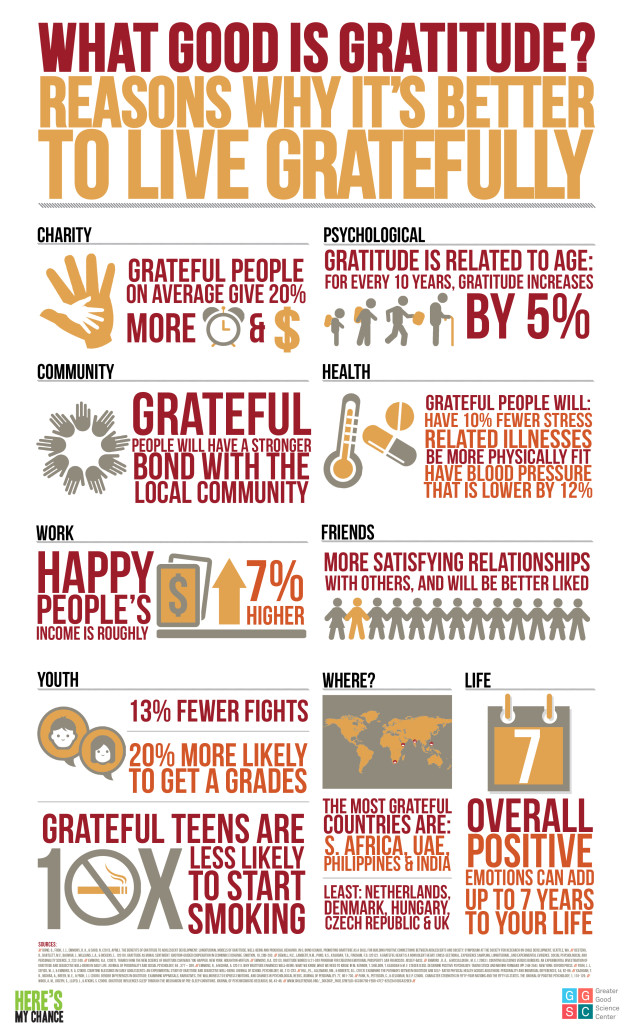As I write this, we are fast approaching the Thanksgiving holiday here in the States. The season has me thinking about  giving thanks and being grateful.
giving thanks and being grateful.
It’s pretty well established that gratitude is good for you. Leading gratitude researcher Robert Emmons has found that gratitude leads to stronger immune systems, lower blood pressure, more feelings of joy, and a greater sense of social connection, among many other benefits.
Guess what? One of the other important benefits is – you got it – becoming more resilient.
So let’s take a look at ways Emmons and others say we can generate more gratitude (and times when being grateful isn’t such a good idea.)
1. Stop and smell the roses. No, really. Smell them.
It’s not just the noticing of things we enjoy that creates the most gratitude, it’s the interaction with our senses that tickles our gratitude bone.
Inhaling the sweet scent of a rose, the ch-ch-ch of a sugar packet as you shake it, or the feel of cool water running over your fingertips helps you savor and appreciate your experience.
And now that you’ve smelled that rose, express your gratitude for it and the pleasure it’s given you.
2. Be grateful in a specific way to people.
It’s wonderful to hold gratitude for things such as roses and sunsets. But when it comes to people, it’s even better to be appreciative of specific things.
Tell your partner, “I so appreciate you vacuuming the carpet when I know it’s my job but you saw how exhausted I was from work this week.”
Say to your friend, “Thanks for asking me for coffee today when you noticed I was feeling down.”
Share with your child, “I love how you share your delight in all of these bright stars in the sky with me here tonight!”
3. Think about death and loss.
Okay, this one may not seem like a lot of fun, but it is very effective.
It’s easy for us to take things for granted – weighty things such as our own lives and the lives of people we love and less consequential things like the joys of chocolate or coffee or texting your best friend.
Thinking about your own death or the loss of a loved one helps you become more grateful for the life you have and for the relationships you enjoy.
And it’s not just a theory, says the Greater Good Science Center’s Jeremy Adam Smith.
“When you find yourself taking a good thing for granted, try giving it up for awhile,” he suggests.
Picture not having chocolate or coffee or – heaven forbid! – not being able to text your friend for a week.
Feeling more grateful for those things already, aren’t you?
4. Be aware of ideas of entitlement.
Do you find yourself feeling like people owe you something because you’re “all that and a bag of chips” as one of my clients says?
Robert Emmons writes, “Seeing with grateful eyes requires that we see the web of interconnection in which we alternate between being givers and receivers. The humble person says that life is a gift to be grateful for, not a right to be claimed.”
5. Remember hard times.
As I’ve often written here on Bounce, perspective is an essential tool of resiliency.
It can also generate more gratitude.
Just recalling tough times in your life helps you see that you made it through that period to get where you are today – which is one thing to be grateful for – and hopefully allows you to have some gratitude about where you are right now.
6. Don’t make gratitude a chore.
In an interesting study on happiness and resilience, researcher Sonya Lyubomirsky had one group of subjects write a gratitude journal three times per week and one group journal one time per week.
Who felt happier and more positive after the study? The group who only kept a gratitude list one time per week.
It seems that gratitude can become a chore if you think that you have to write a list more than one time a week.
Maybe you don’t even have to write a list. But you do have to be conscious and intentional about feeling grateful.
7. Graduate-level gratitude.
Dr. Emmons: “It’s easy to feel grateful for the good things. No one ‘feels’ grateful that he or she has lost a job or a home or good health or has taken a devastating hit on his or her retirement portfolio.”
Jeremy Adam Smith writes: “In such moments gratitude becomes a critical cognitive process—a way of thinking about the world that can help us turn disaster into a stepping stone. If we’re willing and able to look we can find a reason to feel grateful even to people who have harmed us. We can thank that boyfriend for being brave enough to end a relationship that wasn’t working; the homeless person for reminding us of our advantages and vulnerability; the boss, for forcing us to face new challenges.”
When gratitude isn’t such a great idea
Amie M. Gordon, writing for the Greater Good Science Center, wisely points out that gratitude isn’t always appropriate.
1. Feeling grateful for someone who isn’t worthy.
Gratitude isn’t going to help in a relationship that is abusive or just plain wrong for you.
In fact, looking for the positive aspects may just keep you in an unhealthy situation for longer.
2. Avoiding problems through gratitude.
Gratitude helps us get our minds more centered and off of the little things that natter at us on a daily basis.
But, if we always “look for the bright side” and ignore the seriousness of an issue, we may very well get ourselves into more trouble than if we take a realistic view of the problem.
3. Minimizing yourself through excessive gratitude.
There are things you do well. Very well, in fact.
Give yourself credit for these things rather than using overwrought gratitude to appear humble. It’s great to give others kudos for their hard work, but don’t forget about your own!
Finally, here’s a great infographic that sums up a lot about gratitude:

What’s your take on gratitude? Have you ever used it in an unhealthy way? What helps you remember to be grateful? I want to hear about it in the comments below!
This post is based on several wonderful articles posted at the Greater Good Science Center website:
Six Habits of Highly Grateful People, by Jeremy Adam Smith.
Five Ways Giving Thanks Can Backfire, by Amie M. Gordon
How Gratitude Can Help You Through Hard Times, by Robert Emmons
What Gets in the Way of Gratitude? by Robert Emmons
The Greater Good Science Center is extremely cool. They send out a newsletter every once in awhile that is chock full of positive stuff based on research. I think you should subscribe. (No, I don’t get any kickbacks from the GGSC. I’m just really grateful for the good energy they put into the world.)
I also mentioned Sonya Lyubomirsky (don’t try pronouncing that at home) and this is the reference:
Lyubomirsky, S. & Della Porta, M.D. (2010). Boosting Happiness, Buttressing Resilience: Results from Cognitive and Behavioral Interventions. In J.W. Reich, A.J. Zautra, & J.S. Hall (Eds.) Handbook of of Adult Resilience (450-464.) New York: The Guilford Press.
Infographic courtesy of the John Templeton Foundation.






